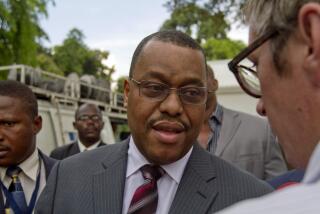Haitian Leader Reportedly OKs Return to Power
- Share via
WASHINGTON — Deposed Haitian President Jean-Bertrand Aristide has agreed to a delicate formula that would restore him to office in exchange for amnesty for the coup leaders who ousted him 19 months ago, a source close to the former president said Tuesday.
The new package was carried to Haiti by U.N. special envoy Dante Caputo, who has been working for months to cobble together an agreement that would restore democracy to the troubled Caribbean island nation.
The latest development came as the Pentagon revealed that the Clinton Administration is considering sending a small contingent of U.S. troops to Haiti--mainly to help with reconstruction efforts--if Aristide returns to office.
Both the United Nations and the Clinton Administration have said they are confident that a solution is near.
The final major sticking point in the negotiations apparently was removed when Aristide dropped his opposition to a blanket amnesty that would prevent prosecution of Lt. Gen. Raoul Cedras and other leaders of the coup that deposed Aristide in September, 1991, after he had served a little more than six months in office as Haiti’s first freely elected chief executive.
According to the source close to Aristide, the former president has long been willing to pardon the coup leaders from “political crimes” like treason but was not willing to extend the amnesty to cover “common crimes” like murder and theft.
The source said that under the plan, Aristide promised not to object if the Haitian Parliament votes for the more sweeping amnesty.
If accepted by Cedras and other leaders of the military-backed government, the plan could result in Aristide’s return to Haiti and an end to the trade embargo that has shredded the economy of a nation that already was the poorest in the Western Hemisphere.
Although Aristide has agreed to the proposed settlement, the military-backed government has been withholding final approval, pending the resolution of a few remaining issues, including details of how Aristide will share some of his new political power.
Strategists said they hope Washington’s seeming willingness to dispatch U.S. troops--initially fewer than 100 in noncombat roles--would add to the pressure on the military to accept the latest plan.
One of the current government’s remaining concerns is that its generals might fall prey to street mobs if the Haitian army were forced to relinquish power without any safeguards. The hope is that the presence of U.S. troops on the island would have a calming effect.
At the same time, officials said that the bulk of any aid that the Americans would deliver would be handled through the Haitian military. This would involve rebuilding military clinics and other medical facilities and transporting food and medicine to be distributed by the Haitian army.
George Stephanopoulos, President Clinton’s communications director, told reporters Tuesday that the United States also may offer to provide long-term training to “professionalize” Haiti’s armed forces and police, action that Aristide and his supporters have long demanded.
“We want to let them (the Haitian army) know that if they become part of the solution, we can work with them, but not if they have unruly gangs running in the streets,” one Administration official said.
The possibility that the United States might send troops as a humanitarian gesture was telegraphed by the Pentagon to Adm. Paul Miller, head of the Atlantic Command, which is in charge of the military’s contingency planning involving Haiti.
But strategists stressed that no decisions have been made and that the U.S. troops would be dispatched only with the approval of the new Haitian government.
The United States frequently deploys military forces to foreign countries to help with construction projects and humanitarian efforts. The Atlantic Command conducted a similar operation in Haiti in August, 1991--barely a month before the military coup.
Officials said the latest deployment would be limited to engineers, medical personnel, military police, lawyers and civil affairs experts, mostly from reserve units, but that some combat troops might accompany them to provide security.
More to Read
Sign up for Essential California
The most important California stories and recommendations in your inbox every morning.
You may occasionally receive promotional content from the Los Angeles Times.













